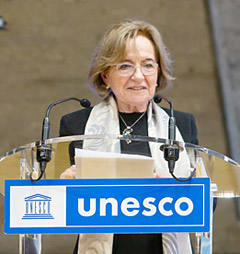
Electronic english version since 2022 |
The newspaper was founded in November 1957
| |
UNESCO Prize Winner
Professor of Physics at the National Autonomous University of Mexico and Member of the JINR Scientific Council Ana Maria Cetto Kramis was awarded the UNESCO Kalinga Prize for popularization of science. The award ceremony was held on 13 November, at UNESCO headquarters in Paris at an event dedicated to World Science Day for Peace and Development that is celebrated annually on 10 November.
 At the gala ceremony, UNESCO Assistant Director-General for Natural Sciences Lydia Brito presented the Kalinga Prize for the Popularization of Science in recognition of efforts to make scientific knowledge more accessible to the masses.
At the gala ceremony, UNESCO Assistant Director-General for Natural Sciences Lydia Brito presented the Kalinga Prize for the Popularization of Science in recognition of efforts to make scientific knowledge more accessible to the masses.
Ana Maria Cetto Kramis has made a decisive contribution to the strengthening and expansion of scientific cooperation between Mexico and the Joint Institute, as well as the strengthening of academic exchange between Mexican organizations and JINR. She became a special guest at the 131st session of the JINR Scientific Council in March, 2022. In the same year, the Committee of Plenipotentiaries elected Ana Maria Cetto Kramis as a member of the Scientific Council. With her participation, a number of meetings were held at which ways of developing bilateral cooperation between JINR and Mexico were outlined. The result was a joint declaration of intent between the National Council of Science and Technology of Mexico (CONACYT) and JINR, signed at the 133rd session of the JINR Council. The declaration reflected the parties' plans to develop joint work in the field of advanced fundamental and applied scientific research.
In 2023, Ana Maria Cetto Kramis became one of the first winners of the OGANESSON Prize, established by the outstanding JINR scientist Academician Yuri Oganessian, for outstanding scientific work and enormous personal contribution to strengthening global scientific cooperation for the sake of peace and sustainable development.
Professor Ana Maria Cetto Kramis is the author of a book for a general audience entitled "Light: in Nature and in the Laboratory" (La Luz: en la Naturaleza y en el Laboratorio), covering the history of the investigation of light and optical theories over the centuries. In total, about 100 000 copies of this book have been sold.
With the goal of scientific education for as many people as possible, Ana Maria Cetto, as president of the Mexican Physical Society, supervised the translation of information materials on various scientific topics into ten indigenous languages of her country. Even today, that her term has expired, translations into other indigenous languages are still done.
In the 1990s, Ana Maria Cetto Kramis founded Latindex, a bibliographic information system, to promote open access to scientific knowledge. Today, she is President of the UNESCO Steering Committee on Open Science and holds the UNESCO Chair in Science Diplomacy and Heritage.
The Kalinga Prize was established by UNESCO in 1951 thanks to a donation from Patnaik Bijoyanand, the founding president of the Kalinga Foundation of India. The prize is awarded every two years and is currently also sponsored by the Government of India. The winner is selected by an international jury and is awarded a prize fund of $40 000, as well as a diploma and the UNESCO Albert Einstein Medal.